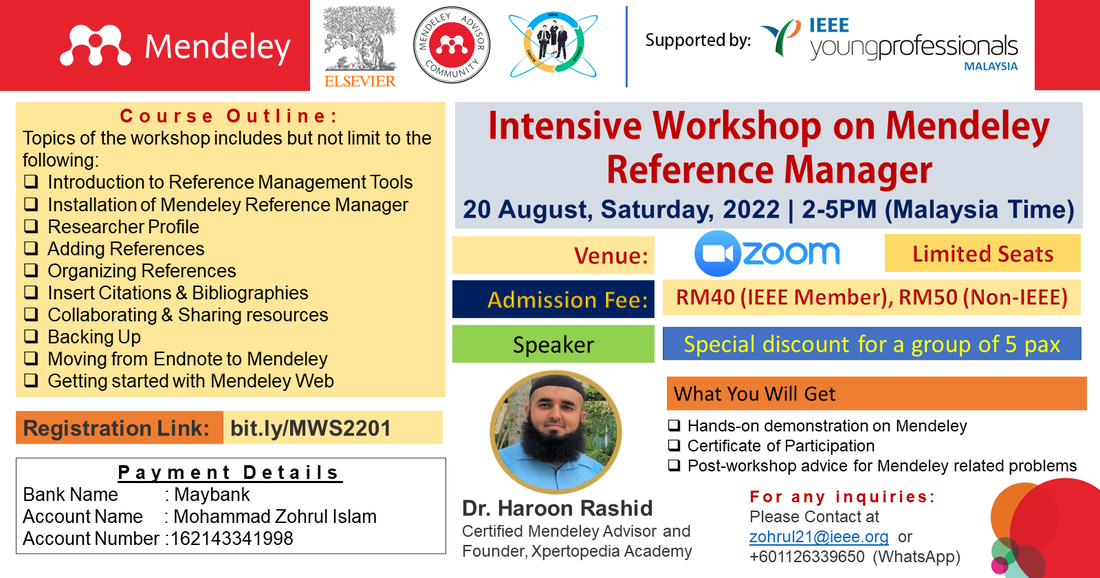Welcome to
dr. Haroon's blog
|
Are you exhausted from managing your references in your thesis or manuscript? Here is good news for you...!!!
Xpertopedia Academy in collaboration with the Mendeley Advisor Community and IEEE Young Professionals Malaysia is pleased to invite you to join an intensive workshop on Mendeley Reference Manager. The details of the workshop are as below: Title: Intensive Workshop on Mendeley Reference Manager Date: 20 August, Saturday, 2022 Time: 02:00 PM - 05:00 PM (Malaysia Standard Time, GMT +8) Platform: Zoom Speaker: Dr. Haroon Rashid Certified Mendeley Advisor & Founder, Xpertopedia Academy E-certificates will be given to all the participants. Registration link: https://bit.ly/MWS2201 For any inquiries, please contact: Mohammad Zohrul Islam [email protected]
1 Comment
AppSumo is the platform 1.25M+ entrepreneurs trust for everything they need to create fulfilling businesses. It got all the tools you need to grow and scale.
Sometimes a job comes along that you may think is perfect for you, you have the skills and the hours may fit around your home life, but the company is not a good match. Finding an employer that fits your needs, as well as the job itself can not always be as easy as it seems. If you don’t need to focus on the financial side of things, and you find that an employer isn’t for you, it may be best to try and keep looking. Your place of work is meant to make you feel comfortable and be a place you want to wake up for, if you’re worried about this being a problem, take some time to reconsider your options. Here are a few tips on how to recognise if an employer is just not for you. The interview process is unorganised An employer’s hiring process can be a reflection of how they are as a business and how they work on a day-to-day basis. Whether the employer has been rude, unprofessional or late, you probably want to think twice about working for a company where people work like this. An interviewer should show up and do all of the same things that they expect from you and as a hard-working employee, you probably deserve better than what they are offering. How you are treated in the interview, is probably how they would treat you as an employee, so ask yourself whether you are happy with that treatment or not. Unreasonable working hours Some employers can expect too much from their employees. They need to understand that where your career is important, you have other things happening in your life that should not be over looked. You need a company that is going to respect your other responsibilities and understand that where you are a loyal employee, not everything is about work. Some employers may give you a set number of working hours for the week and then insist that you should stay late or even hint that you will be working more hours than stated to get the job done. Make sure you understand what they are asking of you in the interview, and if it just all seems like too much, it may be a good idea to start looking elsewhere. The benefits are not for you Some companies will spend time in the interview talking about all of the benefits that you may get in addition to the job and your annual salary. Sometimes these things are there to make the company sound better than it actually may be. Don’t be fooled by this. They may offer free drinks on Friday afternoon or season ticket loans but is this really what you want? Do you want flexible hours that they do not offer? Or the ability to earn extra holiday? Ask yourself what is really important and see if they will work around your needs. More often than not, the benefits are not worth taking a job you will not be happy in. Have they asked you inappropriate questions?
There are some questions in an interview situation that you may just not want to answer. Whether that be because you are unprepared or simply where not expecting the question to come up. Either way, they should not make you uncomfortable. Inappropriate questions can include things like, are you married? Or do you have children? These types of questions have nothing to do with your skills and ability to do the job, so in theory should not be asked. However, they sometimes come into conversation, so it’s probably best to stay away from a company that puts you into an uncomfortable situation. Read online reviews There are cases where you may feel like the interview has gone really well and you like what you have heard so far. However, we all know that things can sometimes be overexaggerated in an interview environment. The employer may be saying things about work load or company culture that are just not true – you never know. Before accepting a job, you may want to talk to some of the other employees and ask for their opinion of the work place. If this is not an option, you can go online and find the company reviews. Websites like Glassdoor also give past and current employees the ability to anonymously rate and talk about the company they work for. It may be worth giving some reviews a read before you make up your mind. There is no clear description of the job Job descriptions can sometimes be a little vague and being invited to an interview can leave you wanting more. In a first interview it can be important to ask the interviewer about the job and what the role actually entails in a little more detail. If they are still being a bit unclear or don’t seem to know exactly what they are talking about, you may want to rethink this job. The employer should know exactly what the job entails, how many hours and things like holiday allowance. Some job seekers also want to know if the company is good with career progression and if they allow internal hires etc. You want to know whether you are going to be making good progression or sitting in a dead-end job. So, if they are beating around the bush, the job may be too good to be true. Source: Charlotte Rogers (IET Engineering & Technology Jobs) Registration is now open for IEEEXtreme 13.0 - the global 24-hour online programming competition.
Grab your friends and start forming your teams today. Grand Prize - A trip to the IEEE conference of your choice, anywhere in the world. Second Place - Team members each receive a US$400 IEEEXtreme Cash Award. Third Place - Team members each receive a US$300 IEEEXtreme Cash Award. Fourth - Tenth place team members each receive a wireless IEEEXtreme phone charger. # Top 100 place team members will receive an Xtreme merchandise bundle and special software gifts from competition sponsors. And the most interesting part is, you just need to be an IEEE Student/Graduate Student Member to join the competition and it is absolutely FREE. Registration will close on 6th Oct 2019 (Sunday) 23:59:59 UTC. Visit IEEEXtreme website (https://ieeextreme.org/) for more information. Good luck! Dr. Haroon Rashid IEEEXtreme Section Lead IEEE Malaysia Section I was two months into the third year of my PhD when it happened. In retrospect, I should have seen it coming. My research wasn’t going great, but I was feeling reasonably confident that my efforts were going somewhere. I had some preliminary research findings and a plan, and I had followed all the advice to schedule regular meetings with my advisor. And here I was, having just sat down at one such meeting when he uttered the dreaded words. “Are you sure this program is right for you?” he asked. “Maybe you’d be better suited for some other kind of work.” I felt punched in the gut. I asked him why. “It just doesn’t seem like you have what it takes,” he said bluntly. “I’ve read your plan, and it’s unrealistic. Review my notes and give it some real thought.” He handed me a copy of the document I had written so optimistically. “See you next week,” I muttered, and then rushed out the door before I began crying in earnest. Should You Quit? That evening, I met a good friend of mine. I had called her for exactly one reason—she had quit the program six months earlier, and I wanted to know why. I told her my story and she nodded sympathetically. “My advisor said the same thing,” she told me, “but was less kind about it.” She told me how in the beginning of their advisor-advisee relationship, she was thrilled to have been assigned to his lab. But he was never satisfied with her results, and would often berate her in front of others for minor mistakes. “I know I should have talked to someone,” she confessed. “But I felt so ashamed. It seemed like nobody else was having the same issues I was. He would insult me while more senior students looked on. I started to hate waking up in the mornings. And then one day, I just thought, maybe he’s right. So I left.” Why Would Your Advisor Ask You to Quit? I walked home in a fog, her words echoing in my mind. “I know I should have talked to someone,” she had said. So I decided that rather than giving up at the first sign of defeat, I would find someone to talk to. A few days later, I met with another professor in our department, whose reputation was one of a wise mentor. Over lunch with several other students in the program, I explained my story. Professor Hwang nodded throughout. When I finished, he asked, “Well, why do you think he feels that way? Have you looked at it from his perspective?” And I realized that I had been so busy feeling sorry for myself that I hadn’t. Professor Hwang told us about a grad student who was formerly in his department. The student was eager, but had some habits that made him doubt her future as a scientist. She was terrified to ask questions, and had messed up some data collection as a result. While Professor Hwang tried to be empathetic, he realized she wasn’t improving. She eventually dropped out of the program. “So,” he said, “I’m not saying you’re like this. But do some self-reflection first.” Self-reflection is the Key to SuccessThe next week I marched into my advisors office with a revised plan and a list of bullet points to address. I told him I had done some self-reflection and realized I needed to ask more questions and take more time with my work. I said I was passionate about succeeding in this field and hoped he was willing to continue working with me. Three years later, I graduated. It turned out that I did need to do some self-reflection. At the same time, I know I was lucky in that my advisor was a reasonable, if not especially personable, guy. My friend who had dropped out was not so lucky. Grad school isn’t supposed to be easy, but it shouldn’t crush your soul. You should build a network of people you can trust and turn to when things get hard. If your advisor suggests that you quit, look at yourself and your work first and examine why he or she may have said that. Talk to your peers and other professors to see what they have to say. Bad advisors are certainly out there, so don’t be afraid to stand up for yourself—but don’t be afraid to be humble and admit what you could do better, either. It’s every grad student’s worst nightmare—your PhD advisor suggests that you quit. What should you do if it happens to you? Should You Quit?That evening, I met a good friend of mine. I had called her for exactly one reason—she had quit the program six months earlier, and I wanted to know why. I told her my story and she nodded sympathetically. “My advisor said the same thing,” she told me, “but was less kind about it.” She told me how in the beginning of their advisor-advisee relationship, she was thrilled to have been assigned to his lab. But he was never satisfied with her results, and would often berate her in front of others for minor mistakes. “I know I should have talked to someone,” she confessed. “But I felt so ashamed. It seemed like nobody else was having the same issues I was. He would insult me while more senior students looked on. I started to hate waking up in the mornings. And then one day, I just thought, maybe he’s right. So I left.” Why Would Your Advisor Ask You to Quit?I walked home in a fog, her words echoing in my mind. “I know I should have talked to someone,” she had said. So I decided that rather than giving up at the first sign of defeat, I would find someone to talk to. A few days later, I met with another professor in our department, whose reputation was one of a wise mentor. Over lunch with several other students in the program, I explained my story. Professor Hwang nodded throughout. When I finished, he asked, “Well, why do you think he feels that way? Have you looked at it from his perspective?” And I realized that I had been so busy feeling sorry for myself that I hadn’t. Professor Hwang told us about a grad student who was formerly in his department. The student was eager, but had some habits that made him doubt her future as a scientist. She was terrified to ask questions, and had messed up some data collection as a result. While Professor Hwang tried to be empathetic, he realized she wasn’t improving. She eventually dropped out of the program. “So,” he said, “I’m not saying you’re like this. But do some self-reflection first.” Self-reflection is the Key to Success The next week I marched into my advisors office with a revised plan and a list of bullet points to address. I told him I had done some self-reflection and realized I needed to ask more questions and take more time with my work. I said I was passionate about succeeding in this field and hoped he was willing to continue working with me. Three years later, I graduated. It turned out that I did need to do some self-reflection. At the same time, I know I was lucky in that my advisor was a reasonable, if not especially personable, guy. My friend who had dropped out was not so lucky. Grad school isn’t supposed to be easy, but it shouldn’t crush your soul. You should build a network of people you can trust and turn to when things get hard. If your advisor suggests that you quit, look at yourself and your work first and examine why he or she may have said that. Talk to your peers and other professors to see what they have to say. Bad advisors are certainly out there, so don’t be afraid to stand up for yourself—but don’t be afraid to be humble and admit what you could do better, either. It’s every grad student’s worst nightmare—your PhD advisor suggests that you quit. What should you do if it happens to you? Source: https://www.enago.com/academy/when-your-thesis-advisor-asks-you-to-quit/
|
AuthorDr. Haroon Rashid is a Pakistani origin Entrepreneur, Motivational Speaker, Engineer and Researcher. He is the Founder & CEO of Xpertopedia Networks and the Managing Director of SH Education Consultants Group (SHEC Group). He is an ICEF Certified Trained Counsellor and Certified Mendeley Advisor. He has authored over 25 research articles and 2 books. Archives
August 2022
Categories |









 RSS Feed
RSS Feed
